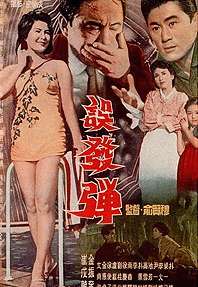Obaltan
| Obaltan | |
|---|---|
 Theatrical poster to Obaltan (1961) | |
| Hangul | 오발탄 |
| Hanja | 誤發彈 |
| Revised Romanization | Obaltan |
| McCune–Reischauer | Obalt‘an |
| Directed by | Yu Hyun-mok |
| Produced by | Kim Seong-chun |
| Written by | Lee Beom-seon |
| Starring |
Choi Moo-ryong Kim Jin-kyu Moon Jeong-suk |
| Cinematography | Kim Hak-seong |
| Edited by | Kim Hui-su |
| Distributed by | Cinema Epoch |
Release dates |
|
Running time | 110 minutes |
| Country | South Korea |
| Language | Korean |
Obaltan (Korean: 오발탄), also known as The Aimless Bullet and Stray Bullet, is a 1960 South Korean tragedy film directed by Yu Hyun-mok. The plot is based on the same titled short novel written by Yi Beomseon. It has often been called the best Korean movie ever made.[1][2]
Plot
The films depicts a man Cheolho, who lives a hard life together with his war veteran younger brother Yeongho, his pregnant wife, and his mother suffering from Posttraumatic stress disorder constantly screaming "Let's get out of here!", due to the aftermath of the Korean War. Cheolho suffers from a toothache but refuses to go to the dentist, despite his brother urging that keeping the toothache is a much worse problem than paying the dentist. Yeongho befriends an actress, Miri. Miri aims to help Yeongho get a job by making him an actor in a film project. While reading his lines for the film's script, Yeongho realizes that his character is being judged for his wounded appearance and he was chosen for the scars he received from the Korean War. Choosing dignity over a rare chance to earn money, Yeongho quits the film. Myeongsuk, Cheolho's sister, is a former nurse who is now a prostitute for American soldiers.
The last, climactic part of the film portrays the brother, Yeongho, robbing a bank using a gun he secretly stole from Seol-hui. After being caught by the police, Yeongho gives up the money, then shortly his gun and himself, breaking down into tears as he is arrested by the police. Yeongho, now in jail, tells Cheolho to take his niece Hae Ok on a trip and be a good father to his wife's child. After hearing that his wife has died from childbirth and failing to even see her body at the hospital or the baby who came out alive, Cheolho finally decides to visit the dentist. While Cheolho has two teeth that must be removed, the dentist refuses to remove more than one tooth for the same day. Adolescent boys try to earn money selling newspapers with the headline of Yeongho's bank robbery. Cheolho tells the taxi driver to take him to the police station to see his brother, but once they arrive, Yeongho orders the driver to keep going anyways constantly repeating his mother's plea "Let's get out of here!". With his family gone and his toothache remaining, the taxi continues to drive aimlessly, leaving Cheolho's fate unknown.
Cast
- Kim Jin-kyu as Cheolho
- Choi Moo-ryong as Yeongho
- Seo Ae-ja as Myeongsuk
- Kim Hye-jeong
- Noh Jae-sin
- Moon Jung-suk
- Yoon Il-bong
- Yu Gye-seon
- Nam Chun-yeok
- Park Gyeong-hui
Reception
The government banned Obaltan because of its unremittingly downbeat depiction of life in post-armistice South Korea. An American consultant to the Korean National Film Production Center saw the film and persuaded the government to release it in Seoul so that it might qualify for entry in the San Francisco International Film Festival. Director Yu Hyun-mok attended the film's premier in San Francisco in November 1963. Variety called Obaltan a "remarkable film", and noted that its "[b]rilliantly detailed camera work is matched by probing sympathy and rich characterizations."[3]
Legacy
The most-cited quote from the film, mentioned in the contemporary Variety review and in later texts on South Korean cinema, is "Let's get outta here! Let's get outta here!"[4]
Availability
In December 2002 Obaltan was released on Region 0 DVD in South Korea with English subtitles,[5] but as of November 2007 is currently out of print.[6] Gregory Hatanaka's Cinema Epoch released the film on Region 1 DVD on March 13, 2008.[7]
See also
- Dead Presidents, a 1995 American film that involves a former Vietnam War marine who commits crime due to poverty
Notes
- ↑ Min, Eungjun; Joo Jinsook; Kwak HanJu (2003). Korean Film : History, Resistance, and Democratic Imagination. Westport, Connecticut: Praeger Publishers. pp. 41, 46. ISBN 0-275-95811-6.
- ↑ http://www.koreanfilm.or.kr/jsp/news/news.jsp?blbdComCd=601006&seq=2882&mode=VIEW
- ↑ Judy. (1963-11-13). "The Aimless Bullet". Variety.
- ↑ Kim, Kyung-hyun (2004). "2. Nowhere to Run: Disenfranchised Men on the Road in The Man with Three Coffins, Sopyonje, and Out to the World". The Remasculinization of Korean Cinema. Durham and London: Duke University Press. p. 52. ISBN 0-8223-3267-1.
- ↑ "오발탄 (The Aimless Bullet)" (in Korean). www.mydvdlist.co.kr. Retrieved 2007-11-07. External link in
|publisher=(help) - ↑ "The Aimless Bullet, or 'Obaltan' (1961)". seoulselection.com. Archived from the original on September 15, 2008. Retrieved 2007-11-07. External link in
|publisher=(help) - ↑ "STRAY BULLET". Cinema Epoch. Retrieved 2008-05-20.
Sources
- Judy. (1963-11-13). "The Aimless Bullet". Variety.
- Min, Eungjun; Joo Jinsook; Kwak HanJu (2003). Korean Film : History, Resistance, and Democratic Imagination. Westport, Connecticut: Praeger Publishers. pp. 41, 46. ISBN 0-275-95811-6.
- "OBALTAN". The Complete Index to World Film. Retrieved 2007-11-08. External link in
|publisher=(help) - Obaltan (1960) at the Internet Movie Database
- Ralske, Josh. "The Aimless Bullet". Allmovie. Retrieved 2007-11-08.
Further reading
External links
- Obaltan at the Internet Movie Database
- Video on YouTube